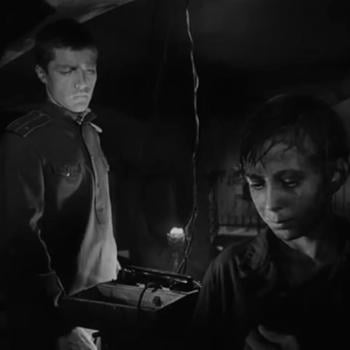Membership in a demanding, distinctive, and stubbornly un-modernized—possibly un-modernizable—church like mine has its costs, to be sure. But it has its benefits as well, even aside from promises of eternal salvation for the faithful. I've written a lot at Salt and Seed about the rewarding communal experience of serving in a Mormon community, the trust, fellow-feeling, practical support, and, yes, the opportunity to practice forgiveness—never forgetting, I hope, that strong LDS wards can sometimes be chilly places for the most vulnerable among us, and that we should never be complacent in reaching beyond our own comfortable circle.
But there's another kind of reward for making one's life in a corner of the American landscape as marginal as the LDS Church, an intellectual reward. The hierarchical, authoritarian nature of the church, with its orientation toward group roles and obedience over individual rights and freedoms—that is to say, everything about the Church that rankles in the context of modern liberal democracy—can provide a set of emotional and intellectual tools with which to examine the buried assumptions of that liberal democracy. The structures of liberalism are so firmly entrenched in the common sense that governs everyday experience in modern America as to become invisible. Thus even when injustices are felt keenly, it can be difficult to find a vocabulary to express them. (The challenges of the Occupy movement in communicating a clear message illustrate this difficulty.) Churches that maintain one foot outside the dominant paradigms of modernity can provide the resources for this kind of criticism.
I want to suggest an example of this dynamic, by which the apparently illiberal features of a conservative church can usefully destabilize the silently-encroaching paradigms of modernity. Specifically I want to float the idea that the all-male LDS priesthood enacts a critique of the notion of meritocracy that vibrates at the center of the American dream. The notion that equal opportunity will allow the best and brightest from all backgrounds to rise to the top by virtue of hard work has energized the American psyche in forms as various as the Horatio Alger novel and the Oprah Winfrey show. The meritocratic promise has unfolded unevenly, to be sure, and in many ways remains incomplete in the face of intractable race- and class-based inequalities. In many ways, the overarching march of American social history can be seen as the unfinished work of drawing all groups into the meritocracy.
Some contemporary observers, however, are worrying not so much about the incomplete reach of the meritocracy but, on the contrary, about the effects of meritocracy itself. Social mobility is notoriously difficult to assess, but by some measures it has actually decreased in American society since the nation's great institutions flung wide their doors to people of any color, creed, or sex. At best, the new elite simply perpetuates a different kind of family privilege than did the old WASP establishment; at worst, meritocracy may in fact reinforce the heartless lottery of inherited genetic advantage that defines the deep history of our species. Whereas the old elite was always vulnerable to charges of hypocrisy and illegitimacy—it was this critique that ultimately brought it down after the second World War, after all—the new elite is more or less secure from critiques leveled in the language of virtuous liberal citizenship: whatever else can be said about them, they probably do represent the brightest of their generation, and heaven knows that they are trained from childhood to work frantically.
Against this backdrop of meritocracy ascendant, an institution like the LDS Church, governed by a priesthood to which women are not admitted solely on the basis of their sex, stands as a puzzle, an affront, or a curiosity. From some perspectives, an all-male priesthood is nothing more than an atavistic institutional carryover from the days of hard patriarchy, sexism pure and simple; from other perspectives, it's a divinely-ordained reflection of the deep cosmic order that secures and connects individuals in a harmonious chain. Either way, a male priesthood is difficult to explain, much less justify, in the language of liberal meritocracy. Indeed, an organization in which an arbitrary half of its membership has no access to institutional authority is the opposite of meritocracy; leadership is not a reward for ability, hard work, or worthiness—it can't be, since many of the most able, dedicated, and worthy members of the church will never hold positions of executive leadership simply by virtue of their female condition. (It's worth noting that earlier rationales for male headship relied on the idea that the curse of Eve rendered women inferior and submissive to men, and thus leadership was indeed a kind of meritocratic reward for men's superior ability and worthiness. But this logic is entirely absent from contemporary LDS discourse.)





